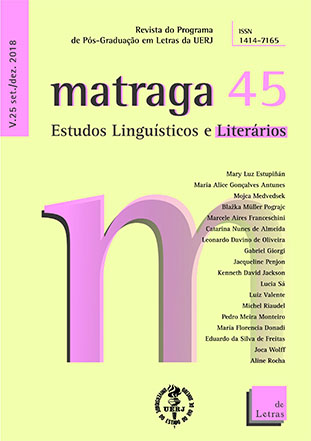Do olhar português sobre Macau: algumas representações poéticas contemporâneas
DOI:
https://doi.org/10.12957/matraga.2018.35487Palavras-chave:
Macau, Memória Cultural, Poesia Portuguesa Contemporânea, Orientalismo Português.Resumo
Macau ocupa até hoje um lugar ímpar na cultura portuguesa, configurando uma entidade simultaneamente histórica, literária, política e mítica. A poesia portuguesa contemporânea tem sido persistente em recuperar os termos da complexa relação que Oriente e Ocidente foram tecendo ao longo dos séculos e essa persistência permite-nos olhar para Macau não apenas como um território geográfico, mas como um conceito com uma considerável força simbólica. Podemos, em certa medida, entender a aproximação ao imaginário macaense como nostalgia do império, como esperança do encontro não só com um passado histórico, mas também literário (através de figuras como Luís de Camões, Camilo Pessanha ou Wenceslau de Moraes, com vivências ligadas àquele território). Alguns poetas escolhidos para este estudo trabalharam por alguns anos no território (José Alberto Oliveira, Gil de Carvalho ou Fernanda Dias), outros realizaram viagens por tempo mais limitado (Sophia de Mello Breyner Andresen, em 1977, a convite do Conselho da Revolução, onde iria tomar parte das celebrações do Dia de Camões; António Manuel Couto Viana, entre 1986 e 1988, a convite do Instituto Cultural de Macau, onde colaborou enquanto docente; e Eugénio de Andrade, em 1999, numa visita breve que resultaria anos mais tarde na obra Pequeno Caderno do Oriente, publicada em 2004). A evocação dum conjunto fixo de lugares (por exemplo, a Gruta de Camões ou o Jardim Lou Lim Ieoc), continuamente retomados pela escrita, resultou na cristalização duma cartografia literária associada a Macau, cujo mapeamento e a interpretação este estudo propõe.
Downloads
Downloads
Publicado
Como Citar
Edição
Seção
Licença
AUTORIZAÇÃO
A Matraga – Revista do Programa de Pós-Graduação em Letras da UERJ está autorizada a publicar o artigo ora submetido, caso seja aceito para publicação online. Fica atestado que a contribuição é original, que não está sendo submetida a outro editor para publicação, e que a presente declaração é a expressão da verdade.
Os trabalhos publicados no espaço virtual da Matraga – Revista do Programa de Pós-Graduação em Letras da UERJ serão automaticamente cedidos, ficando os seus direitos autorais reservados à Matraga. Sua reprodução, total ou parcial, é condicionada à citação dos autores e dos dados da publicação.

A Matraga utiliza uma Licença Creative Commons - Atribuição-NãoComercial 4.0 Internacional.





